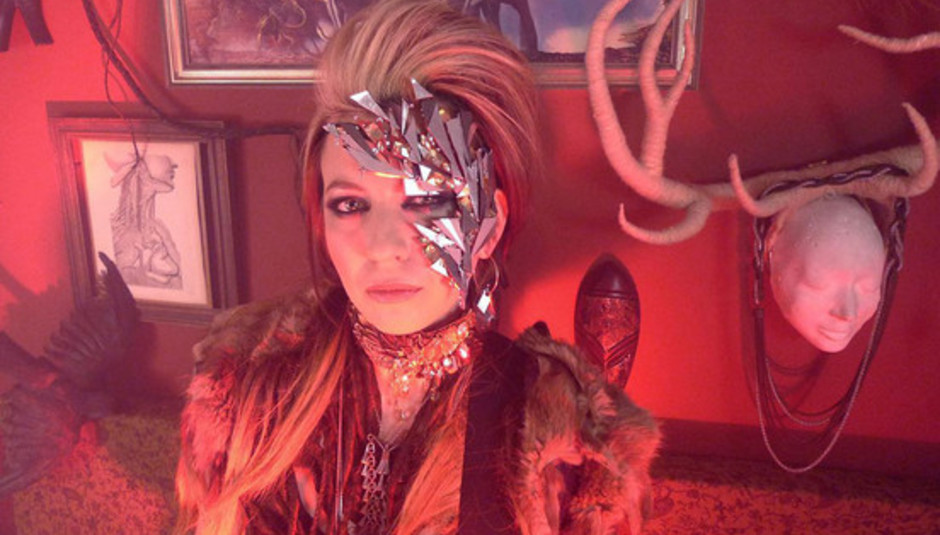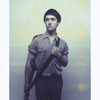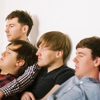Charlotte Hatherley likes her science fiction. “Look at Blade Runner,” she says, sat in a deserted Islington bar. “I mean, what’s the story in Blade Runner? It’s so fucking simple. 1984? it’s just a love story really. That’s the thing with the great science fiction - it’s a fantastical world, but the human stories are still very human, people trying to figure out their lives. Especially with Phillip K Dick. There’s no point doing something unless there’s a human element that people can relate to. That’s the point with this - I didn’t want it to be all shiny-shiny, crazy headdress, futuristic ideas, it has to have content. Quality. There has to be meat to it. I’m really happy people get that, because it’s a really emotional record, it comes from quite a dark place, a lot of it”.
She’s talking about Sylver Tongue, the one-woman electro-fantasy project that has consumed her life. She’s drawn a line under the “jeans and t-shirt” years and reinvented herself as a glitter-faced disco art-queen. This, she says, is what she does now, “the main priority.” Few would have seen it coming. A few years back Charlotte Hatherley was Ash’s resident rock chick, lending her impressive licks and ear for melody to some of the last decades biggest alternative hits. Her solo career both before and since leaving that band has taken the form of XTC tinged indieish guitar pop, becoming increasingly more complex across three well received records, 2004’s Grey Will Fade 2007’s The Deep Blue and 2009’s New Worlds. Her reinvention as a techno Ziggy Stardust by way of 80s Kate Bush and Prince is going to turn some heads.
“I think that’s a great thing”, she explains. “The last thing I wanted to do was to be predictable, and I think with New Worlds I’d done the indie guitar record that I wanted to do. Not that I think that it’s a flawless piece of work, but after that I’d really drawn a line under it. I’d done three records and that was my ‘Charlotte Hatherley’ solo experience. And it kind of burnt me out as well, because I did them all quite quickly, those three records, so I decided to take a bit of time off. I ended up doing lots of touring playing for Bat For Lashes, then Katie Tunstall, I was playing lots with Bryan Ferry, and had a big break from writing.”
It was the period as a touring session player that started her towards her new identity. “When you play with that many musicians”, she says, “you’re just like a big sponge, taking in all these influences. I think one of the biggest things was the more aesthetic side of things, how to present the music in a sort of interesting and exciting way, especially live. So when I went back to writing these songs they were so different anyway, that I came up with idea of creating a new band name, a new sound, a new approach to the look, dressing up and embracing the more theatrical side of the music, which I don’t think I’d really done before.”
The first fruits of that inspiration emerged into the world last year with the Something Big EP; just four tracks but containing more ideas than, say, Jake Bugg’s entire recorded output to date. It’s genuinely good stuff - catchy, laced with delicious harmonies and deceptively straightforward melody that sits across bubbling and clattering percussion and soaring synths. It sounds like the music a replicant girlband from the future would make if they’d had Depeche Mode and Kate Bush described to them but never actually heard them. In space. It is, in short, brilliant. “My influences have always been fairly clear”, she explains; “David Bowie, Kate Bush, XTC, but I don’t think I’ve ever sounded like that. Where as this time the references are out there as being very 80s. And when I say 80s I mean Talking Heads and Japan, it’s not Duran Duran, it’s sophisticated pop music. Like Prince, who I think is incredible, and really quite avant-garde, that’s where my influences are from”. Not that this is a record of tribute sounds and cloned 80s icons. “I know what my references are, but I don’t think it sounds like them. Sometimes as a female artist you get compared to a lot of other female artists, which I find quite frustrating. The references are out there for all to see, but I don’t think this particularly sounds like any of them”.
Making such a complete break from her past has actually freed Hatherley to make the most nakedly emotional and honest work of her career, using Sylver Tongue’s metallic headdresses and Gagaish masks and a flair for pop flamboyance to make music that is actually much more economic and elegant, both lyrically and musically, than anything she’s done before. Sylver Tongue becomes a characterized version of Charlotte Hatherley, in a sense able to express things the girl with the guitar hid behind awkward time signatures, and angular riffs. She explains that “it’s definitely allowed me to show, despite having that mask, that exaggerated side of myself, to be much more free with thoughts and ideas, especially lyrically, and so even though it’s all very fantasy, it’s a much more grounded record”.
The starting point was a character in the Ziggy Stardust mould, but over time, the idea grew into something more reflective and personal: “I was really drawn to that idea of playing a character. But as with most of the things that I do, that was my intentions but then you sort of end up being much more natural, so I used it as a way of getting that side of myself out”. It’s no small irony that the most abstract thing she’s done has allowed her to be the most herself. “The lyrics are a lot less guarded”, she says “but I think that’s more a confidence thing. It’s saying something very directly without thinking ‘that’s generic or boring’, or feeling like I have to make things deliberately abstract, although I do a lot of that cut-up technique, the Burroughs inspired thing. Before I think I was a little bit too abstract, where as now I’m laying myself bare a lot more. That’s just come from years of trying to get this place”.
Perhaps the most exciting thing about the whole project is its sophisticated approach to what is essentially pop music. Like Kate Bush before her, Hatherley has managed to take a wealth of abstract ideas, in her case sci-fi dystopias, Burroughs’ cut-up poetry, Natasha Khan’s other-worldiness and Bryan Ferry’s sense of distance, and create something musically very accessible, and visually engaging. You get the sense that were budget available she would be doing something spectacular indeed. At its heart, Sylver Tongue is about the spectacle of pop.
“I definitely think when I do live gigs I want it to be an experience”, she says, “and as someone who goes to gigs, I’d always prefer to be taken out of myself for an hour an swept away. An easy way of doing that is by combining great music and an interesting stage show, and having great lights. I want to provide something people haven’t seen before. I don’t want to go to a rock gig and just see the same old shit. Because I’ve been to a million of them. I think because I’ve done so many gigs, and played with so many people I want it to be exciting for me. So I keep pushing - how can I make the set visually exciting? How can I make the band look amazing? I want it to be a transformative experience as much as I can be. So that’s what I’m working on. I think it’s been about getting back into the headspace of being a front person, which is a very different mindset to playing guitar in someones band. I couldn’t go onstage looking like this, I’d be terrified. A lot of front people who are incredible onstage are very shy and quiet, and I was always been surprised by that, but now I get it: you need to put on a suit of armour to get out there and put yourself up for the world to see. It’s quite a big leap for me. So it helps, having Mad Max leather trousers and shawls, strong make up and hair. It makes me feel powerful, and I want the music to sound fucking powerful as well. In my mind everything has to go up a level now - nothing I do can be average, it has to be amazing”.
She’s definitely learned about spectacle from the best. One of her first gigs with Ash was opening for U2 who proceeded to enter the stage by stepping out of a giant lemon shaped glitter ball.
“Yes! I mean, U2 are not my favourite band in the world, but it’s the same with Coldplay - no matter that their songs never really register with me, when you’re in a massive crowd you’re just [sings] “I will try to fix you”... “where the streets have no name” you get swept away, you just get lost in the experience. Obviously those are massive stadium gigs and I’m trying to translate that to much smaller shows, but the idea’s the same. Bjork’s always incredible, watching Natasha Khan every night was really inspirational as well, because she just has this confidence about herself. That’s why I love watching David Bowie perform, he’s got this incredible commanding presence on stage, and he’s so comfortable with his body. I’ve always got a guitar in front of me so I’m always amazed when I see someone out there dancing, just with the mic, communicating. That’s the other thing I’m trying to learn - communicating the lyrics. It’s been quite fascinating for me.”
The range of influences, despite springing directly from the age of analogue synths and VHS copies of Dune combines to make something that sounds remarkably contemporary.
“That’s why I like those late 70s/early 80s films and music”, explains Hatherley. “There’s this interesting cross over where music technology is starting to happen, synthesisers and artificial drums, and in film technology in terms of special effects, but if you watch something like Blade Runner it’s still models and painted background, because CGI hasn’t really taken over. It’s the same with music. Those big, hideous 80s sounds hadn’t taken over yet so you have people experimenting with all of this new stuff, making really cool music. Kate Bush did amazing things with the equipment of the time, Peter Gabriel, Talking Heads, Brian Eno, and I think that aspect of it is really incredible. Then by the end of the 80s everyone had gone fucking mad and OD’d on new technologies. I love those early days. Watch Blade Runner now and it’s absolutely timeless, even 2001 is hugely impressive, and that was,what, 1968? It’s all about attention to detail.”
Yes, Charlotte Hatherley loves science fiction (she’s currently soundtracking a Sci-Fi short which is “fucking hell, making me the happiest person in the world”) and it’s certainly an influence on her work. But it’s not in the lyrics, it’s not even in the synth-heavy sounds. It’s in the attention to detail. Like Ridley Scott or Stanley Kubrick she’s building a world with incredible attention to detail, one that can be either poured over and examined, or simply sat back and enjoyed. She is Sylver Tongue and she’s heading for the future at lightspeed.
“It’s not the fourth Charlotte Hatherley album”, she say. “I see it as the first Sylver Tongue record. It’s year zero. It’s hard to explain without sounding like what I’ve done before doesn’t matter, because obviously it does, but I think it’s more honest. It’s the thing that I’m most proud of. I’ve genuinely released records before where I’ve thought “hmmm, I’m not sure about that”, but this time I’ve been so relaxed about this. There’ll be more Sylver Tongue records, this isn’t a one off sideshow, it’s my main thing.”
The Something Big EP is out now.






















